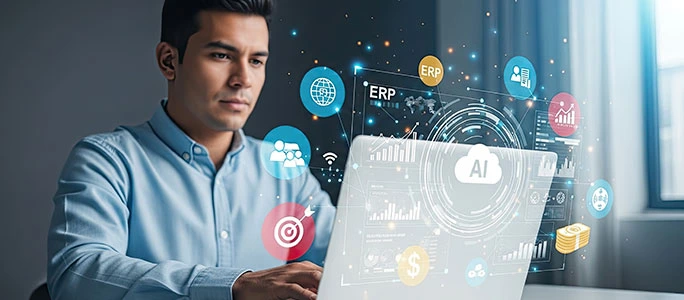
Once considered something of a luxury, the ERP software have today become an absolute necessity for businesses.
For any organization — small, medium or large; established or just past the stage of being a startup — investing in a good ERP software is no longer an option.
Though the ERP systems have been around in business software landscape for a long time now, they have become an indispensable part of businesses in recent times.
Predominantly developed to manage discrete manufacturing processes, the ERP software have over the years gone on to accommodate process manufacturing industries as well.
Besides, they have continually evolved to become more robust, powerful, affordable, and easier to use.
Talking specifically about last decade or so, ERP solutions have incorporated the latest technological trends as well as advanced tools to solve critical business problems.
Trends such as Cloud technology, the Internet of Things (IoT), Artificial Intelligence (AI), etc. have been integrated with the ERP software to make the businesses simpler, and to help them stay ahead of the competition.
In the future too, ERP systems will continue to get updated with new features, concepts, functionality, technology and new trends that emerge on to the scene, thus helping the manufacturers add even more value to their software investments.
In this blog, we shall take a look at all such future key ERP trends- that are likely to dominate the ERP landscape- from a technology platform and architecture perspective. Read on:
Greater focus on Cloud ERP:
From the technology point of view, Cloud ERP is likely to reach a tipping point in the near future, with more and more enterprises opting for it and as a result, more and more major vendors shifting greater focus towards their cloud offerings.
Past trends have suggested that most top business executives are more comfortable with on-premises ERP systems. However, this is likely to change, with Cloud ERP solutions gaining wider acceptance.
AI–enabled intelligent ERPs:
AI has got the backing to be the most disruptive force in technology in the coming time, as more and more manufacturing businesses around the world are already preferring AI-enabled ERP software to transform their business operations byminimizing the costs and reducing the human errors.
With its ability to learn, read, and process a large amount of data, AI-enabled ERP system has quickly established itself as an intelligent ERP, which can do better analyzing and forecasting, enhance the business processes, and facilitate the more efficient use of resources.
The collaboration of conversational AI with ERP software is the next big thing in the ERP landscape, with ERP’s integration with voice-search applications and assistants like Amazon’s Alexa and Google’s Echo being fine examples of it.
lot traceability:
One of the most important goals of an ERP software is to provide real-time actionable data and information to the business leaders.
Its integration with IoT technology helps accomplish that goal. Manufacturers are equipping their resources (products, machines on the shop floor, etc.) with chips, sensors, and tools through which they can be connected together by using the internet.
And when these connected devices are combined with automated systems, it becomes possible to gather information, analyze it, and create an action.
Looking at how large enterprises are starting to create their own IoT ecosystems, it won’t be surprising if ERP solutions join the IoT bandwagon and the vendors use data from this connection.
In-memory computing:
In-memory computing is yet another future trend that is going to impact the ERP systems from technology platform and architecture perspective.
In-memory computing uses random access memory (RAM) to store data instead of storing it in the hard disk of a computer.
This enables regular caching of the data, which in turn allows faster and easy retrieval of information as well as analysis.
It significantly enhances the processing speed of an ERP system, thus helping businesses fetch more accurate reports in real time.
Mobile ERP & enhanced features:
Increased use of mobile devices in the workplace and a growing remote workforce is going to push for greater mobile accessibility, forcing the vendors to introduce breakthrough advancements in this area.
Expect more automation of important business processes and activities in near future.
Besides, expect more ERP vendors to offer enhanced features, especially in the field of security, automation and user interfaces.
Micro-verticalized solutions:
In the coming time, more and more businesses will move towards micro-verticalized ERP solutions.
With the use of emerging technologies like AI and others, custom ERP solutions will be built to suit the exact needs of industries through their specific capabilities.
So, the manufacturers will opt for industry-specific ERP solutions that are better suited to their particular micro-vertical, for example, meat & poultry product manufacturers will opt for a meat & poultry software instead of a food ERP.
Two-tiered ERP:
The two-tiered ERP refers to an arrangement in which a company uses one ERP at the head office and a different ERP for a subsidiary at a different location.
This kind of approach is particularly beneficial for businesses that run different processes at different places, helping them meet the needs of all locations with a better cost structure.
An approach mostly adopted by large enterprises, the two-tiered ERP trend is likely to be a buzzword in the near future.
Hybrid ERP option:
While the majority of the business world would be busy pondering which one to pick from either of on-premises ERP and Cloud ERP, many businesses are likely to opt for a third option by going for a hybrid ERP.
The hybrid ERP option is a mix of on-premises and Cloud-based solutions, wherein the organizations have the flexibility of adding new modules to an existing ERP without having to build everything from scratch.
Let’s say a company already has an on-premises ERP, but wants to add CRM functionality without purchasing additional hardware.
This can be done by introducing the Cloud infrastructure in the existing set-up, and this trend is fast catching up.
Closing thoughts
Over the years, businesses have evolved, and so have the ERP systems. Even in the near future, businesses will continue to look for better and more efficient ERP solutions to stay ahead in the race.
Cloud ERP systems, intelligent ERP solutions (integrated with technologies like AI, IoT etc.), in-memory computing, mobile ERPs, two-tiered & hybrid ERP approaches, and micro-verticalized ERP software are likely to be the buzzword.
One such ERP, which will keep businesses ahead during this transformational phase, is BatchMaster ERP. Get in touch by reaching out at sales@batchmaster.com for free demo and consultation.




















